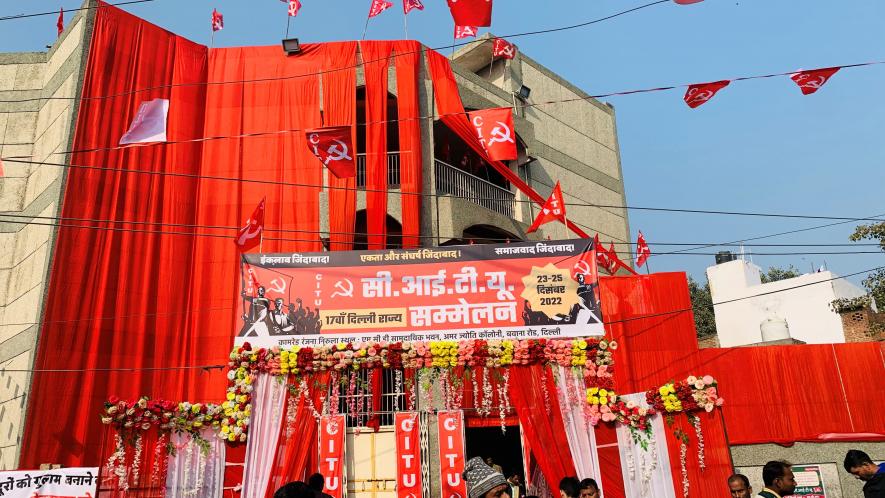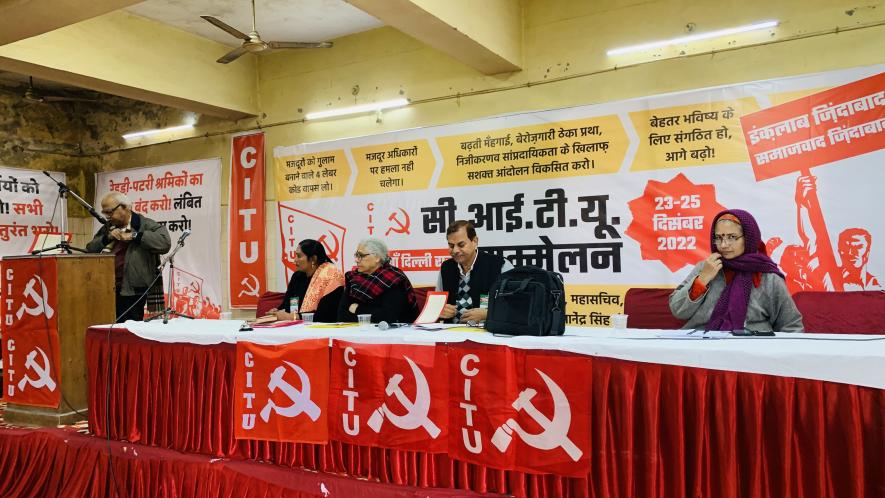Repeal Labour Codes, Stop Privatisation, Say Workers at 17th CITU Delhi Conference

Photo by Ravi Kaushal
More than a hundred worker delegates from 61 labour unions came together to participate in the 17th CITU Delhi Conference at the MCD community hall on Saturday at Amar Jyoti Colony in Bawana Industrial Area.
The workers maintained that the conference, despite being an organisational activity, was useful to rally working people severely hit by inflation, increased contractualisation, and privatisation.
Rohit Kumar, a worker at a medical instrument factory in the neighbouring area, told NewsClick that the working conditions are increasingly unbearable as employers are demanding longer hours of work but not paying salaries on time. He said, “There are factories which may give you minimum wages prescribed by the state government, but salaries have been delayed by months. A two-month delay is the norm now. The situation is so bad that we were handed Rs 5,000 on Diwali when we expected that the factory owners would settle our accounts! If governments can put corrective measures to deal with non-payment of Goods and Services Tax (GST), why can’t they do it for us? Labour inspectors are simply missing from action. Similarly, inflation is making lives miserable. Not everybody gets ration under the public distribution system. How will we survive?”
When asked about school and medical expenses, Kumar lamented: “Our children go to government schools and you know what to expect there in terms of the quality of education. If somebody gets ill, god knows how they will be looked after.”
Sushil Rai, who stood next to Kumar, revealed another ordeal faced by the workers. “The minimum wage for unskilled labour in Delhi is Rs 16,792, but factory owners offer Rs 8,000-Rs 9,000. In the case of women workers, it could be as low as Rs 6,000. In this case, if the factory is closed due to no production for seven days, one would get only Rs 4,000. What’s my fault if the owner does not give us any work? I am available for work, but they wound cut my salary. It is a sheer dictatorship.”
The workers at the conference also seemed perturbed by the privatisation of public sector undertakings and emphasised that it would only make things worse. Recalling the recent struggle at the Container Corporation of India, Vinay Kumar Chaudhary, a labour union leader at Maharatna Company’s headquarters in the national capital, told NewsClick that it is important for permanent government employees to join hands with contractual workers to save national assets.
“The government may sell its shares, but it has no right to change service conditions. Until now, we could get contractual workers full minimum wages and other social security benefits but it would not be possible from the moment companies are privatised. What happened with BALCO, NALCO, BPCL and other companies would also happen to us if we were not united,” said Chaudhary.
Sidheshwar Shukla, a teacher of history at Rajdhani College, Delhi University and a delegate, told NewsClick that the Bawana area was deliberately chosen to hold this conference. He said, “There are several historical aspects. It is the place where Marathas defeated Abdali in the battle of Narela. Bawana also represented a cluster of 52 villages where communists led the anti-feudalism struggle between 1932 and 1960 and its champion Tarachand got defeated in the first municipal council elections by just three votes. Presently, there are several thousand industrial units in Bawana, Bhorgarh, and Narela. The successive governments rehabilitated slum dwellers of Delhi by uprooting them to this area, which also makes it a working-class base.”
Talking about the mandate of the conference, Anurag Saxena, general secretary of Delhi CITU, told NewsClick that it remains a democratic exercise to reflect upon the challenges and tasks assigned by the last conference. “If I talk about challenges today, the new four labour codes are the biggest threat to the working class. What has been earned from decades of struggle is being destroyed in the name of ease of doing business. Even though these codes are yet to be implemented, we are seeing that employers are demanding longer hours of work – up to 10-12 hours. Old rules say that if you are making someone work for more than eight hours, you should pay overtime dues. Even Indian multinationals are demanding 10-hour workdays now. Similarly, fixed term contract is being used to hire workers. We submitted our suggestions but they were outrightly rejected. So, we boycotted tripartite meetings with governments and employers too,” he said.
“I think farmers’ struggle showed us the way to deal with this government. We will launch a similar struggle because the challenge is quite unprecedented,” he added.
Polarisation: Political Project of the Right
Addressing the conference, CITU general secretary Tapan Sen said that the intense polarisation campaign by RSS-BJP is aimed at breaking the unity of the working people. He said, “We are witnessing a structural crisis of capitalism across the world where the super-rich are increasingly assisted by the strongmen – be it Donald Trump or Narendra Modi for maximisation of profits. We saw earlier crises of capitalism too where it caused two major world wars but it could come out of it. Now, there is no escape.”

Photo by Ravi Kaushal
Talking about the workers’ movement following WWII, Sen said, “After the war, when capitalism expanded its reach, we found that the rights of the workers were also recognised. International workers’ movements spread throughout the Third World. It was the workers’ movement which actively helped in liberating African countries from their French and British Colonisers. However, we are seeing that all things the workers could build in the last several decades are being handed over to the super-rich.”
“Look at the speed with which our public sector undertakings are getting privatised. Ministers are saying that we are getting rid of the debt. Super-rich today believe that they need strongmen like Trump and Modi because only they break the unity of working people on pre-existing fault lines – be it class, caste or race. There are changes in visa policies, bans on international workers’ migration and sinister propaganda to justify racial discrimination. Are they saying that workers should just vanish? No, but they should not ask for social security, limited hours of work and decent working conditions. Thus, it is our duty to bring together these sections based on the real experience of workers,” added Sen.
Get the latest reports & analysis with people's perspective on Protests, movements & deep analytical videos, discussions of the current affairs in your Telegram app. Subscribe to NewsClick's Telegram channel & get Real-Time updates on stories, as they get published on our website.
























